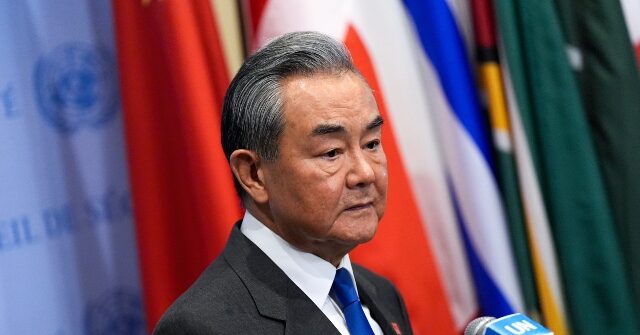Frozen out of peace talks between the U.S. and Russia after years of posturing as a peace broker for the Ukraine war, China complained on Wednesday that the world is paying too much attention to the Ukraine conflict while ostensibly ignoring issues such as the plight of the Palestinians.
Chinese Foreign Minister Wang Yi, who also holds a high rank in the Chinese Communist Party’s Central Committee, is currently chairing a U.N. Security Council (UNSC) conference on “multilateralism.” Wang used the conference as a platform to shift world attention away from the dramatic launch of negotiations between the U.S. and Russia to end the Ukraine war.
“Although the international community is currently focused on the Ukraine issue, global concerns extend beyond Ukraine, with numerous pressing issues, including the Gaza conflict, that demand international attention and should not be marginalized,” Wang insisted, as quoted by China’s state-run Global Times.
“It has been over 70 years since the U.N. passed a resolution to establish two states, Palestine and Israel, yet only half of the two-State solution has been implemented. While the state of Israel was established long ago, the Palestinian people still do not have their own state, with many displaced and living as refugees,” he said.
Wang reiterated China’s call for all parties to “expedite the implementation of the two-State solution” and “implement the Beijing Declaration to achieve unity and self-reliance,” along with recognizing “Palestine” as a full member of the United Nations.
The “Beijing declaration” Wang referred to was signed in July 2024 by Hamas, Fatah, and several other Palestinian factions to set aside their differences, which often lead to bloodshed. The U.N. endorsed the declaration as an “important step towards furthering Palestinian unity.”
“Palestinian unity, as we’ve said many a time, is crucial for peace and security and for advancing the aspirations of the Palestinian people for self-determination and for a fully independent, democratic, contiguous, viable and sovereign Palestinian State,” U.N. spokesman Sephane Dujarric said in July.
One problem with Wang’s frantic efforts to refocus global attention on Gaza, a crisis where Beijing has a putative role in negotiations, is that the civilized world is growing very uneasy over the abuse and murder of the hostages Hamas took on October 7, 2023. This is not a particularly opportune moment to demand concessions to the brutal terrorist government that started the Gaza war.
Furthermore, a great deal of diplomatic oxygen was sucked out of the room when President Donald Trump offered his controversial proposal to take control of Gaza and rebuild it after relocating the Palestinians.
The proposal has not been well-received outside of Israel, but it had the effect of galvanizing Arab powers into making their own counter-offers to rebuild Gaza at enormous expense. China was, once again, frozen out of having any real impact on the developing situation. Wang will not garner much attention by simply repeating an unrealistic demand for a Palestinian state.
Perhaps sensing this shift in the balance of power, Wang on Tuesday slammed Trump’s Gaza proposal as a callous attempt to play games with the lives of the Palestinians.
“Gaza and the West Bank are the homeland of the Palestinian people, not a bargaining chip in political trade-offs. The Palestinians governing Palestine is an important principle that must be followed in the post-conflict governance of Gaza,” Wang declared.
This is a bit rich, given that China solves its own “Palestinian problems” by herding millions of people into concentration camps, destroying their culture, and using them as forced labor, not by respecting their “homeland” or giving them a state. The vast hypocrisy of the Chinese Communist Party – its tendency to drone about vague platitudes and make demands of others that it would never meet itself – are major reasons why its bids for global diplomatic leadership keep stalling out.
China gave up its chance to play a meaningful role as a peace broker in Ukraine by stubbornly refusing to condemn the Russian invasion, opportunistically taking advantage of worldwide economic disruptions caused by the war and pushing an absurdly vague “peace plan” that no one outside of Beijing could pretend to take seriously.
Read the full article here
